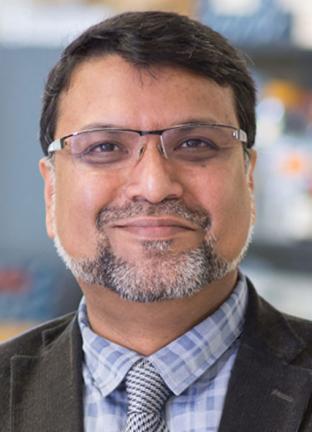Speaking on: Acoustic Immune Priming Therapy for in situ tumor vaccines.
(CME credits will not be available for this lecture)

Chandan Guha, MBBS, PhD
Professional Interests
Exploring therapeutic potential of stem cell regeneration in the event of radiation insult
Exposure to high doses of ionizing radiation in the event of therapeutic, accidental or intentional incident such as nuclear/radiological warfare can lead to debilitating injuries to multiple organs resulting in death within days depending on the amount of radiation dose and the quality of radiation. Unfortunately, there is not a single FDA-licensed drug approved against acute radiation injury.
Radiation damage to multiple organs often described as multiple organ dysfunction syndrome (MODS) or acute radiation syndrome (ARS) results from rapid depletion of radiosensitive cells, these cells are usually the stem or progenitor cells with high proliferative capacity; naturally, bone marrow stem cells (BMSC), and intestinal stem cells (ISC), which are extremely critical in maintaining a pool of peripheral blood cells and in maintaining villi for the absorption of nutrients are highly sensitive to radiation. One of the most efficient ways of rescuing MODS is to administer fresh cells that can repair, support and/or replace the damaged cells and repopulate the damaged tissue with healthy cells. The Rad-Stem Center for Medical Countermeasures against Radiation (RadStem CMCR) program at Einstein is developing stem cell-based therapies to treat acute radiation syndrome (ARS) that results from radiation injury.
Radiation-induced gastrointestinal syndrome (RIGS) results from a combination of direct damage to intestinal crypt and endothelial cells, and subsequent loss of the mucosal barrier leading to microbial infection, septic shock and systemic inflammatory response syndrome (SIRS). Currently, there is no treatment for RIGS in clinic. Irradiation induces apoptosis of crypt ISC, endothelial cells and enterocytes within hours. Acute loss of cells in situ requires rapid compensation of their functions and this is best achieved using cell replacement therapies. We are interested in exploring intestinal regenerative therapy with a combination of systemic administration of growth factors and cell replacement therapy to salvage Gl function post-radiation exposure. We are testing combinations of: a) intestinal stem cell growth factor, R-spondinl (R-spol), b) TLR ligands, and c) transplantation of bone marrow-derived endothelial progenitor cells (EPC) and mesenchymal stem cells (MSC) to restore IR-damaged ISC niche, protect against IR-induced cell death and provide growth signals for host ISC regeneration, thus providing protection and mitigation from RIGS.
Preparative live irradiation for hepatocyte transplant in acute liver injury and cirrhosis
Hepatocyte transplantation (HT) is a very attractive alternative to liver transplant in the treatment of both inherited and acquired liver diseases. However, benefits of this procedure are currently limited by the inability of the transplanted hepatocytes to proliferate in the host liver, and lack of a noninvasive method to evaluate the repopulation of transplanted hepatocytes in the liver. In order to develop a clinically feasible protocol for HT, we are exploring preparative hepatic irradiation (HIR) for liver repopulation (in place of liver transplant) to deplete host hepatocytes and permit preferential proliferation of the engrafted donor cells in response to hepatic mitotic stimuli. Our lab was the first one to demonstrate that preparative HIR and partial hepatectomy (PH), followed by HT results in the replacement of virtually all host hepatocytes by the transplanted non-irradiated hepatocytes in 12 weeks. We are interested in using inducible pluripotent stem cells (iPSC)- derived hepatocytes following highly focused irradiation of the damaged liver in place of a liver transplant. We are also interested in exploring non-invasive biomarkers to validate that the transplanted hepatocytes can efficiently replace host hepatocytes upon liver irradiation.
Cancer Immunotherapy
Radiation therapy (RT) has been used as a standard treatment modality for many solid tumors. While tumoricidal properties of RT are instrumental for standard clinical application, irradiated tumors can potentially serve as a source of tumor antigens in vivo, where dying tumor cells would release various tumor antigens slowly over time. Using different in vitro and in vivo tumor models we, and others, demonstrated that RT enhances oxidative stress, and augments the release of necessary activating signals for DC such as endogenous danger associated molecular pattern (DAMP) molecules from irradiated cells. These RT-mediated processes lead to an increase antigenecity of irradiated cells which augments antigen presentation leading to an effective anti-tumoral immune responses. However the underlying mechanism of this processes has still to be determined.
Over the last years we have been interested in designing novel tumor vaccines that amplify the tumor immune response using conventional and exploratory cancer therapies. In particular we are focusing on evaluating the immunogenic properties of radiation therapies and determine how immunotherapeutic molecules can synergize with RT in boosting immune cells cell function. We are also interested in exploring therapeutic effect of ultrasound therapy in the treatment of solid tumor. Our recent work on use of Listeria-based vaccine therapy in combination of RT shows that this strategy is more effective than RT alone.
